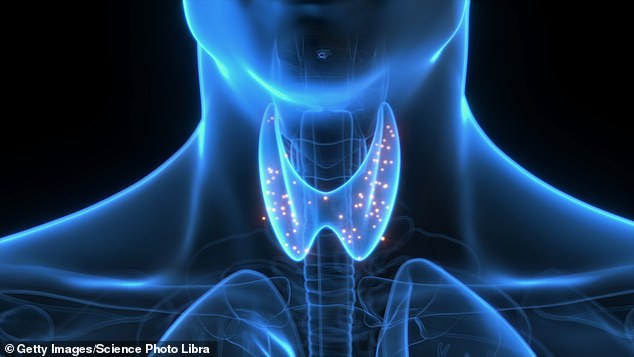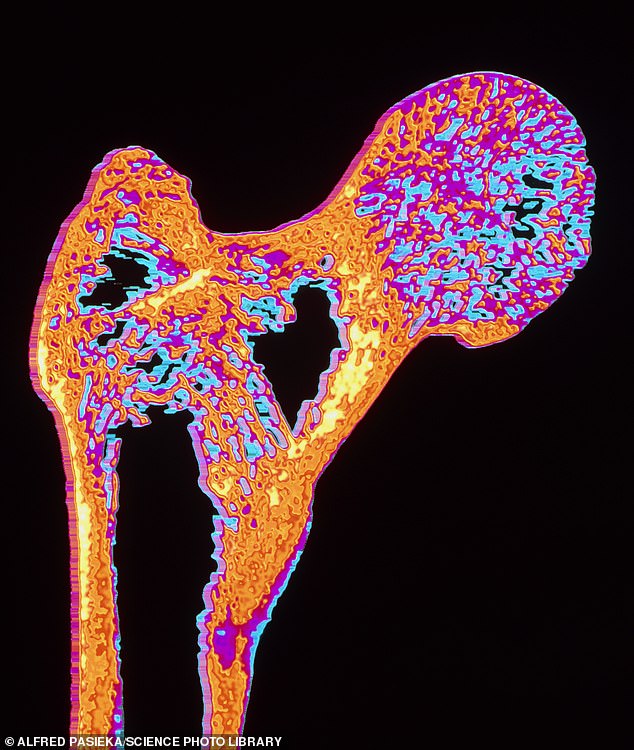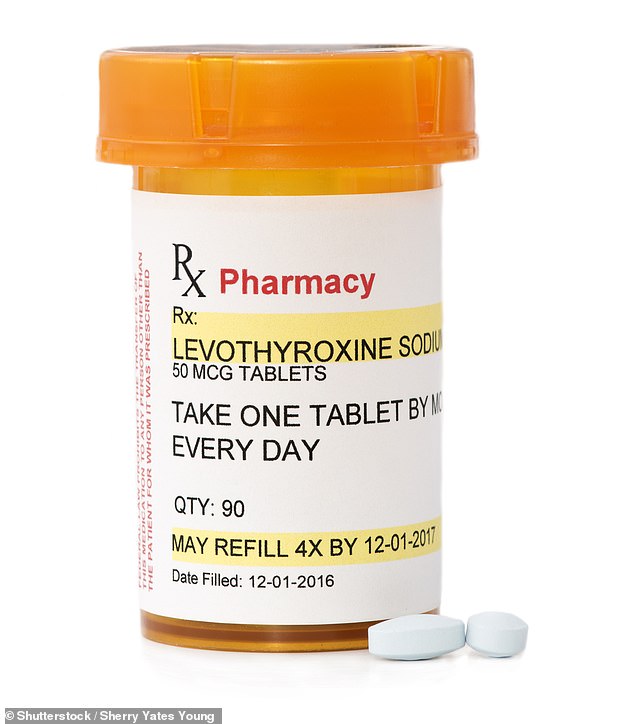Thousands of Britons taking medication for a common hormonal condition could be at risk of bone loss, research suggests today.
Around one in five Britons are affected by an underactive thyroid, caused by problems with the butterfly-shaped gland in the neck that governs functions ranging from digestion to heart rate and mood.
However, levothyroxine, pills that cost just a few pence a day to combat the disease, could increase the risk of osteoporosis, a bone-thinning disease.
Research has long suggested that too much thyroid hormone accelerates bone loss, increasing the risk of the disease.
But now, American scientists who tested the drug in dozens of patients found that this risk was still increased among those with “normal” levels of thyroid-stimulating hormone.
Professor Shadpour Demehri, a radiology expert at Johns Hopkins University in Maryland and co-author of the study, said: “Our study suggests that even following current guidelines, levothyroxine use appears to be associated with greater bone loss in older adults.” .
Dr Elena Ghotbi, lead author of the study and postdoctoral researcher at Johns Hopkins University, added: “The data indicate that a significant proportion of thyroid hormone prescriptions can be given to older adults without hypothyroidism.
“This raises concerns about subsequent thyroid hormone excess, even when treatment is directed at reference range targets.”
Levothyroxine, pills that cost just a few pence a day to combat the disease, could increase the risk of losing bone mass and bone density.

Around one in five Britons are affected by an underactive thyroid, caused by problems with the butterfly-shaped gland in the neck that governs functions ranging from digestion to heart rate and mood.
Levothyroxine, sold under the brand name Eltroxin, is one of the most prescribed medicines in the UK.
Around 1.36 million people in England take it and prescriptions increased by 9 per cent between 2016 and 2022, according to figures published in The Lancet last year.
In the study, researchers evaluated 81 patients who were taking levothyroxine and 364 who were not taking it, with an average age of 73 years and a thyroid-stimulating hormone level of 2.35.
Normal levels are usually 0.4 to 4.0 milliunits per liter (mU/L).
During a six-year follow-up, they found that those taking levothyroxine suffered “greater loss of bone mass and total body bone density.”
Patients taking the drug who had a “normal” level of thyroid-stimulating hormone also suffered loss of bone mass and density, the researchers added.
Dr. Jennifer Mammen, study co-author and associate professor of endocrinology at Johns Hopkins, said adults taking levothyroxine should discuss their treatment with a doctor and periodically monitor their thyroid function tests.
He said: “A risk-benefit assessment should be undertaken, weighing the strength of the treatment indications against the potential adverse effects of levothyroxine in this population.”

Research has long suggested that too much thyroid hormone accelerates bone loss, increasing the risk of osteoporosis, a bone-thinning disease. In the image, x-ray of the head of a femur suffering from osteoporosis.
The research will be presented in full at the annual meeting of the Radiological Society of North America next week in Chicago.
According to the British Thyroid Foundation, an underactive thyroid is not a risk factor for osteoporosis.
However, they advise that adults prescribed levothyroxine should have blood tests periodically, at least once a year, to ensure that thyroid hormone levels “are not too high.”
“Continued high levels of thyroid hormone can lead to the development or worsening of low bone density and osteoporosis.”
Figures show that at least one in 20 people in the UK have a thyroid disorder.
The thyroid produces two key hormones: triiodothyronine (T3) and thyroxine (T4), which help regulate key body functions such as heart rate, temperature, and mood.
Hypothyroidism, where the gland produces too few hormones, causing weight gain, fatigue, feeling cold, constipation, and dry skin and hair.
Women are ten times more likely to be affected than men, although it is not clear why, and the most common trigger for both thyroid problems is an autoimmune disease, in which the body mistakenly attacks thyroid tissues.
There are 3.5 million people living with osteoporosis in the UK, but it is often known as a ‘silent disease’ as there are no symptoms until someone breaks a bone.
Half of women and one in five men over the age of 50 will suffer a fracture, most often in the spine or hips, due to this disease, which causes bones to become so brittle that a fracture can be caused by a cough or a sneeze.
These fractures are the fourth leading cause of disability and premature death in the UK.

